
Poker is a card game that requires both a high level of skill and luck to win. The game puts a person’s analytical, mathematical and social skills to the test and provides valuable life lessons that can be applied to other areas of life.
In addition to the math, physics and sociology involved in poker, it also teaches players how to control their emotions. The game requires them to conceal their excitement, fear and other emotions at the table in order to protect their advantage against their opponents. This emotional stability translates to real-life situations, as it enables them to handle stress and pressure in a calm manner.
It also teaches patience, which is a vital life lesson. A good poker player will wait to see if they have a strong hand before betting. They will not chase a loss or throw a tantrum over losing money. Instead, they will learn from their mistakes and move on. This patience and ability to move on from failure will serve them well in other areas of their lives.
Finally, poker teaches players how to read other people’s body language and other non-verbal cues. This is a very important part of the game, as it helps them to understand what their opponents are thinking and how they can exploit them. This is a skill that can be used in other areas of life as well, such as at the office. The more a player practices this, the better they will become at it.